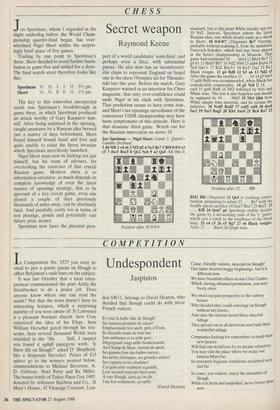CHESS
Secret weapon
Raymond Keene
Jon Speelman, whom I regarded as the slight underdog before the World Cham- pionship quarter-final began, has over- whelmed Nigel Short within the surpris- ingly brief space of five games.
Trailing by one point to Speelman's three, Short decided to avoid further humi- liation in game five and settled for a draw. The final match score therefore looks like this:
Speelman 1/2 1/2
1 1 V2 31/2 pts
Short 1/2 1/2 0 0 1/2
11/2 pts The key to this somewhat unexpected result was Speelman's breakthrough in game three, in which Speelman produced an attack worthy of Gary Kasparov him- self. After being surprised in the opening, caught unawares by a Russian idea brewed just a matter of days beforehand, Short found himself bound hand and foot and quite unable to resist the fierce invasion which Speelman mercilessly launched.
Nigel Short must now be kicking not just himself, but his team of advisers, for overlooking the existence of that crucial Russian game. Modern chess is so information-intensive, so much depends on complete knowledge of even the latest nuance of openings strategy, that to be ignorant of a key recent game, even one played a couple of days previously thousands of miles away, can be absolutely fatal. And painfully costly too in terms of lost prestige, points and potentially vast future prize money.
Speelman now faces the pleasant pros- pect of a world candidates' semi-final, and perhaps even a final, with substantial purses. He also now has an incontrovert- ible claim to represent England on board one in the chess Olympics set for Thessalo- niki late this year. Before the match, Gary Kasparov warned in an interview for Chess magazine, that only over-confidence could undo Nigel in his clash with Speelman. That prediction seems to have come true, and Short's lax openings surveillance of the concurrent USSR championship may have been symptomatic of this attitude. Here is that dramatic third game. Watch out for the Russian innovation on move 10.
Jon Speelman — Nigel Short: Game 3, Queen's Gambit Declined.
1 d4 Nf6 2 c4 e6 3 Nf3 d5 4 Nc3 B e 7 5 Bf4 0-0 6 e3 c5 7 dxc5 Bxc5 8 Qc2 Nc6 9 a3 Qa5 All this is
Position after 10 0-0-0
standard, but at this point White usually opts for 10 Nd2. Instead, Speelman selects the latest Russian idea, one which clearly came as a shock to Short. 10 0-0-0!? (Diagram) Be7 Varying, probably without realising it, from the miniature Gurevich-Sokolov, which had just been played in the Soviet championship in Moscow. That game had concluded 10. . . dxc4 11 Bxc4 Be7 12 g4 b5 13 Bxb5 Bb7 14 Nd2 Nb4 15 axb4 Bxb4 16 Nc4 Qal+ 17 Kd2 Bxc3+ 18 Ke21 Qa2 19 Ral Black resigns. 11 g4 Rd8 12 h3 a6 13 Nd2 e5 After the game the sacrifice 13. . . b5 14 g5 bxc4 15 gicf6 Bxf6 was recommended, when Black has considerable counterplay. 14 g5 Ne8 If 14 . • • exf4 15 gxf6 Bxf6 16 Nb3 followed by Nd5 and White wins. The text is also hopeless and should be replaced by 14 . . . Nh5! 15 Nb3 Qb6 Now White simply wins material, and he retains the initiative. 16 Nxd5 Rxd5 17 cxd5 exf4 18 dxc6 fxe3 19 fxe3 Bxg5 20 Kbl bxc6 21 Bc4 Ra7 22
Position after 22. . Bf6
Rhfl Bf6 (Diagram) 23 Qe4 A crushing centra- lisation, preparing to refute 23. . Re7 with the deadly queen sacrifice 24 Qxe7 Bxe7 25 Rxf7. 23 . . . Kf8 24 Qxh7 g6 Speelman swiftly decides the game by a devastating rush of his 'e' pawn, which sets a torch to the residence of the black king. 25 e4 c5 26 e5 Bg7 27 e6 Black resigns. After 27 . . . Bxe6 28 Qxg6 wins.














































 Previous page
Previous page